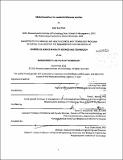Market incentives for pandemic influenza vaccines
Author(s)
Preis, Julia Kay
DownloadFull printable version (4.400Mb)
Other Contributors
Harvard--MIT Program in Health Sciences and Technology.
Advisor
Fiona E Murray and Aaron S. Kesselheim.
Terms of use
Metadata
Show full item recordAbstract
It has been estimated that 100 million plus individuals could perish if a virulent influenza pandemic were to occur. In wake of the 2009-10 H1N1 pandemic and in an era of economic austerity, however, industry lacks clear incentives to invest in vaccines for other high-risk strains. The cyclic nature of pandemics also means we can expect another influenza pandemic within the next 20 years. In this environment, design of incentive mechanisms for funding development of vaccines against strains with known pandemic potential, but for whom vaccine technology is currently lacking, would be welcomed. This research explores which novel incentive mechanisms could induce investment in and development of processes for production of vaccines for these high risk strains. Interviews with vaccine developers and funding agencies and analysis of the pipeline of influenza vaccines in development were conducted. This thesis finds that there is a dearth of vaccines against influenza strains of known pandemic potential, such as H2, H7 and H9; that current pandemic preparedness efforts are not focused on these strains; that funding for pandemic preparedness efforts in H2, H7 and H9 would help incentivize development of vaccines against these strains; and that support for seasonal influenza, regulatory changes, alignment of public and private sector goals, and increased vaccine acceptance are also required to incentivize the development of vaccines against strains of known pandemic potential such as H2, H7 and H9. Furthermore, this thesis recommends that policy makers increase funding for pandemic preparedness so that programs may be initiated or expanded to include additional high risk influenza strains; that US and EU regulatory regimes for pandemic influenza vaccines be harmonized; and that governments promote public awareness of the importance of influenza vaccination.
Description
Thesis (S.M. in Health Sciences and Technology)--Harvard-MIT Program in Health Sciences and Technology, 2012. Cataloged from PDF version of thesis. Includes bibliographical references (p. 60-61).
Date issued
2012Department
Harvard University--MIT Division of Health Sciences and TechnologyPublisher
Massachusetts Institute of Technology
Keywords
Harvard--MIT Program in Health Sciences and Technology.